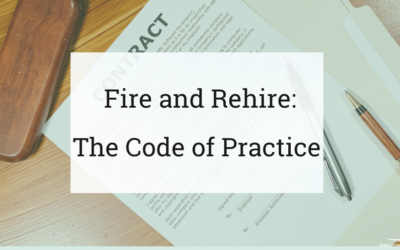1) Miscalculating start date
An employee with less than two years service cannot bring a claim for unfair dismissal (exceptions apply). however if you get their start date wrong you may unfairly dismiss an employee with over two years’ service, therefore giving them an unfair dismissal claim on a plate. An unfair dismissal could potentially cost the business a year’s salary or £89,493 whichever is less in compensation. You should consider and take advice on the impact of:
- any previous periods of employment;
- whether the breaks between periods of employment will constitute a break in terms of continuity of service;
- whether future work was promised to the employee at the end of one period of employment;
- any trial shifts or periods.
2) Not paying in lieu of notice
When dismissing an employee you may wish to consider paying the employee in lieu of notice, in other words paying them for the notice period and asking them not to work their notice.
Where an employee has been dismissed it may be wise to get them out of the work place sooner rather than later. The age old adage of “nothing like a woman scorned” has nothing on an employee who feels they have been wronged and wants vengeance.
When dismissing an employee with less than two years not only do you need to consider the start date but the date the employment ends. If the notice period goes beyond the two year period the employee will be entitled to bring a claim for unfair dismissal.
3) Ignoring ACAS
ACAS, the Arbitration Conciliation Advisory Service, is the first point of call before a claim can be brought in the employment tribunal. A potential claimant must contact ACAS, who will be asked if they want to conciliate(they don’t have to but the vast majority do). During conciliation the two parties are allocated a Conciliator to try and resolve the matter without needing to use the tribunals.
By ignoring the attempts of the Conciliator you lose the chance to:
- understand the basis of any potential claims being brought;
- the ability to settle should you wish;
- gather the necessary documents that may be required for any future claim;
- Obtain early legal advice from Employment Law Solutions.
4) Ignoring a claim form
A claim form, commonly called an ET1, sets out the claims that are being brought by a claimant and the grounds which they think justify their claim. The claim form will be sent to you with a response pack, this includes the ET3, the defence to a claim. The ET3 must be submitted within 28 days of the date which the claim form was sent to you.
A failure to submit an ET3 can result in the claimant winning the claim by default and compensation be due. Although there are options to rectify this and an application to have the default judgment set aside can be made this extends the tribunal process, resulting in additional work to be carried out and ultimately increased legal costs.
5) Lack of management consistency
Generally speaking, managers must ensure that they are acting fairly and consistently when dealing with employees. To take two examples, if a manager disciplines one employee for sending porn via work email but not another, employees may consider why one has been treated less favourably (disciplined) than the other. In most cases employees argue that it is because of a protected characteristic (race, religion, sex, sexual orientation etc). In order to avoid discrimination claims all employees should be treated fairly.
In another example, a farmer dismissed a farm hand for abusing an animal and lost in tribunal. The farmer had followed all of the processes properly but because he had not acted on the first two occasions he found the employee abusing the animal the dismissal was held to be unfair. Consistency is key, if the behaviour was so severe as to result in dismissal it should have occurred the first time, not the third, or at least the employee should have been disciplined on the previous occasions.
6) Ignoring signs of employee burnout
Burnout is a state of physical, emotional and mental exhaustion caused by excessive and prolonged stress. Surveys have uncovered that a staggering 77% of professionals have experienced burnout at their current job. Employee Burnout can lead to a number of problems in the workplace – reductions in productivity, motivation, job satisfaction and increased or prolonged periods of absence to name a few.
Recognising Employee Burnout early is one of the most effective methods of dealing with it. Furthermore, businesses have a duty of care to reasonably support your employee’s health. A failure to identify or manage the causes of burnout could in the most extreme cases result in claims of discrimination.
7) Not complying with National Minimum Wage
All employees have the right to be paid National Minimum Wage (NMW). A failure to pay NMW can result in penalties amounting to 200% of the amount owed to employees and can result in the employer being named and shamed by HMRC in an annual report which obviously affects reputation and the ability to recruit.
8) Ignoring the ACAS code
The ACAS Code of Conduct on Disciplinaries and Grievances in the Workplace governs how employers and managers should deal with disciplinaries and grievances. A failure to follow the Code can result in either an unfair dismissal claim or give employees the right to resign and claim constructive dismissal.
9) Not taking Legal Expenses Insurance
Our legal expenses insurance sourced via RK Henshall provides businesses with cover against three huge potential costs:
- the costs of preparing the defence to the claim;
- the costs of representation at the tribunal hearing(s);
- the cost of any compensation should a judge decide some needed to be paid to the employee.
The costs of an employment tribunal can be huge and can have devastating impacts on cash reserves, cash flow, and investment plans.
10) Not locking up…
Managers should ALWAYS lock the doors at the end of the day. With offices unsecured who know who will be waiting for you in the morning…
Happy Halloween!




